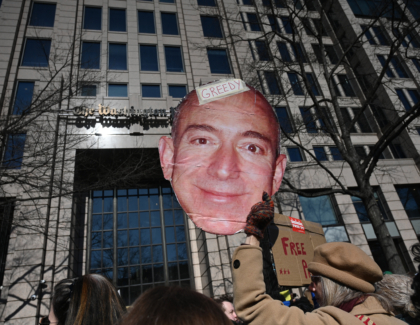Sign up for the daily CJR newsletter.
By Brian Montopoli
Journalists have long understood confidentiality to exist solely between a source and a reporter. If someone speaks “on background,” the only ethical way in which a reporter can divulge the person’s name would be if the source changed his mind and decided to go on the record.
Yesterday, however, the Bush administration gave Fox News Channel permission to broadcast remarks from a background briefing by former Bush counterterrorism adviser Richard Clarke that were originally made on the condition Clarke not be identified. Clarke, of course, has been the target of White House attacks since going public with allegations that the administration did a “terrible job on the war against terrorism.” The remarks at issue, which were made in an August 2002 telephone conversation with a small group of reporters, were generally supportive of the president’s anti-terror efforts.
Journalists should be reluctant to go off the record. But once they do so, the agreement between reporter and source must hold. Thus Fox News’s choice to broadcast the remarks represents an odious concession of journalistic authority. By violating Clarke’s confidentiality, Fox News allowed the administration to effectively recast the confidentiality arrangement to be one that exists not between source and reporter but between the source’s employer and the reporter’s news organization.
The absurdity of such an arrangement is not difficult to grasp. Imagine, for example, a whistleblower who speaks to a reporter anonymously in order to expose malfeasance within his company. By Fox News and the White House’s standards, it would be up to the company — not the source himself — to decide whether or not such a conversation would remain off the record. The company would, of course, choose to expose the source, rendering the reporter’s promise of anonymity moot. That might help Len Downie toward his dream of reducing anonymous sources in the pages of The Washington Post, but it would also make it awfully hard for reporters ever to get inside information on the companies — or the government — they’re covering.
Such a bad precedent, of course, should be resisted by news organizations at all costs. But if the White House insists on asserting that information coming from the executive branch is confidential only at their whim, it might soon have to face unintended consequences. Consider the case of CIA operative Valerie Plame, whose name “two senior administration officials” leaked to syndicated columnist Robert Novak, possibly as revenge against her husband, retired diplomat Joe Wilson. (Wilson had gone public with allegations that the administration had ignored his pre-war report that Iraq had not attempted to obtain uranium from Niger.)
The White House, which has opened an investigation into the leak, has publicly asserted that it does not know who leaked Plame’s occupation to Novak. And Novak has refused to divulge the identity of the sources, citing his journalistic responsibility. But if the White House can authorize Fox News to release Clarke’s “on background” comments, can’t it also grant the same privilege to Novak (or his employer, the Chicago Sun-Times)?
The circumstances in the Clarke case and the Plame case are only partially analogous, since Clarke’s background briefing likely had more of the tenor of an official event than the Plame leak. The White House maintains that Clarke’s briefing was officially sanctioned, while the Plame leak was not. And Novak certainly seems likely to resist naming the source, even if the White House’s gives its blessing.
But it’s hard to deny the broad underlying principle in both cases: a government official anonymously shared information with the press. If the White House is the final authority when it comes to the confidentiality rights of its employees, as its actions yesterday suggested, then all it must do to wrap up its investigation is grant Novak permission to release the name. Under the White House’s logic, he won’t have any reason not to.
Here’s the problem: while such an arrangement might theoretically works to the press’ advantage in the Plame affair, 99 out of 100 times it will not. In the vast majority of cases, taking confidentiality authority away from sources would make it harder for reporters to discover the truth. Anonymity, after all, has its advantages. Just ask Deep Throat.
That’s why Fox News’ decision to run the Clarke briefing yesterday was so irresponsible. The press has already made too many concessions to the White House, which tends to view the fourth estate as one more special interest. By violating its confidentiality agreement with Clarke, Fox News sent a message to potential whistleblowers that they should be wary of coming to the press. And the only people that serves are those who want secrets kept.
Has America ever needed a media defender more than now? Help us by joining CJR today.






